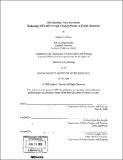Old standbys, new standards : evaluating LEED-ND through existing models of green urbanism
Author(s)
Martin, Sophie C. (Sophie Christina)
DownloadFull printable version (29.00Mb)
Alternative title
Evaluating Leadership in Energy and Environmental Design for Neighborhood Developments through existing models of green urbanism
Other Contributors
Massachusetts Institute of Technology. Dept. of Urban Studies and Planning.
Advisor
Eran Ben-Joseph.
Terms of use
Metadata
Show full item recordAbstract
The U.S. Green Building Council, the Congress for the New Urbanism, and the Natural Resources Defense Council are currently developing a rating system aimed at evaluating the environmental sustainability of new neighborhood developments. The system, known as LEEDND (Leadership in Energy and Environmental Design for Neighborhood Developments), will be the first comprehensive set of planning and design standards that has the potential for widespread adoption by the development industry. In the absence of a set of standards like these, planners and developers have traditionally looked to older communities that exhibit well-regarded environmental design as models. Because LEED-ND has the potential to supplant these example as a model for guiding future environmental planning and design endeavors, the extent to which LEED-ND captures the values manifested in earlier models should be evaluated. This thesis applies the LEED-ND standards retroactively to three existing communities that the planning and development professions have held up as good examples of environmentally sensitive design. Rather than using the new rating system to evaluate the developments, the developments themselves are used to evaluate LEED-ND and the degree to which it reflects the goals of traditional ecological planning. While the case studies each score high enough to be considered "LEED Certified" (on a modified version of the LEED-ND standards), they all follow a pattern of poor performance on several credits related to smart growth and New Urbanist design ideals. These points indicate areas in which the environmental values of the planning profession have changed over time, and how these values may manifest themselves in the physical design of the built environment. (cont.) The final analysis addresses the challenges of developing systems for evaluating and ranking development projects and how LEED-ND could be adapted to encourage environmentally sustainable design across the spectrum of urban to rural neighborhood development.
Description
Thesis (M.C.P.)--Massachusetts Institute of Technology, Dept. of Urban Studies and Planning, 2008. Includes bibliographical references (p. 149-152).
Date issued
2008Department
Massachusetts Institute of Technology. Department of Urban Studies and PlanningPublisher
Massachusetts Institute of Technology
Keywords
Urban Studies and Planning.